Introduction
When it comes to choosing the right ingredient for cooking and baking, the debate between coconut oil vs butter is a hot topic among health enthusiasts and culinary experts alike. Both have unique nutritional profiles and offer different benefits and risks to consider.
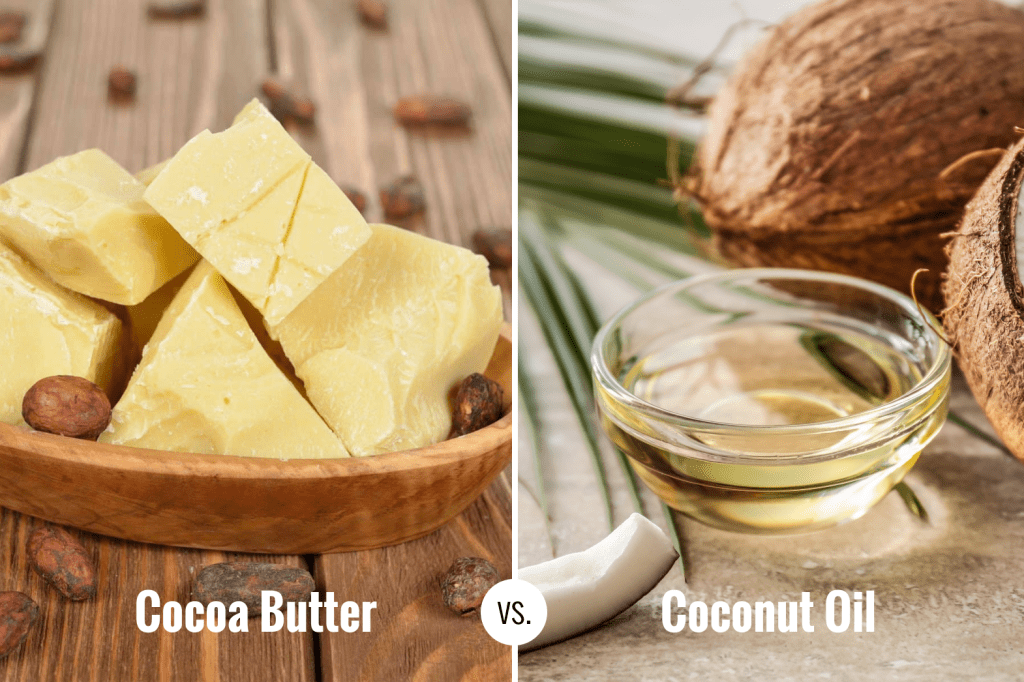
This comprehensive comparison will delve into the specifics of coconut oil versus butter, examining their nutritional content, health benefits, potential risks, and culinary uses to help you make an informed decision for your dietary needs and preferences.
Understanding the impact of these fats on our health is crucial, as they are commonly incorporated into our daily diets.
Recent studies, such as the one published in BMJ Open, have shed light on the effects of dietary fats on our well-being, emphasizing the importance of choosing the right type for optimal health outcomes (source).
With this in mind, let’s explore the characteristics of coconut oil and butter, breaking down the science to guide your choices in the kitchen and beyond.
Nutritional content
Coconut oil
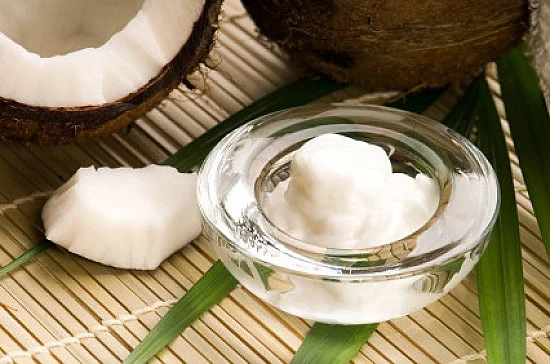
Coconut oil is renowned for its high concentration of saturated fats, particularly medium-chain triglycerides (MCTs) like caprylic acid and lauric acid.
These MCTs are known for their metabolic benefits and are rapidly absorbed by the body, providing a quick source of energy. Unlike other oils, coconut oil is low in vitamins but its MCT content, accounting for over half of its fat composition, plays a significant role in digestive and metabolic health.
The unique processing of unrefined, or extra virgin, coconut oil preserves its natural antioxidants and phenolic compounds, which can influence its health effects (source).
Despite its saturated fat content, coconut oil does not significantly raise total cholesterol or low-density lipoprotein (LDL) cholesterol levels as much as other saturated fats, such as those found in butter. This makes it a subject of interest in discussions about cardiovascular health and weight management.
Its distinct flavor and high smoke point also make it a versatile choice for various cooking methods, particularly for those seeking a plant-based alternative to dairy products (source).
Butter
Butter, particularly when sourced from grass-fed cows, boasts a rich array of nutrients, including a complex mix of over 400 fatty acids and a high content of fat-soluble vitamins such as A, D, E, and K2. The presence of butyric acid and conjugated linoleic acid (CLA) in butter contributes to its anti-inflammatory properties and a range of health benefits.
Grass-fed butter is especially valued for its higher levels of these nutrients compared to conventional butter, making it a preferred choice for many health-conscious consumers. Its balanced profile of saturated, monounsaturated, and polyunsaturated fats provides a nutritional advantage that supports various bodily functions (source).
Moreover, the unique fatty acids found in butter, such as CLA, have been linked to positive effects on weight management and metabolic health. These benefits, along with the rich, creamy taste that butter imparts to dishes, make it a staple in culinary traditions around the world.
However, it’s important to note that butter’s higher saturated fat content may raise cholesterol levels, which is a consideration for those monitoring their cardiovascular health (source).
Here’s a comparison table highlighting some key nutritional aspects of coconut oil and butter.
| Nutrient/Component | Coconut Oil (1 tablespoon, 14g) | Butter (1 tablespoon, 14g) |
|---|---|---|
| Calories | 120 | 102 |
| Total Fat | 14g | 12g |
| Saturated Fat | 12g | 7g |
| Monounsaturated Fat | 1g | 3g |
| Polyunsaturated Fat | 0.5g | 0.5g |
| Trans Fat | 0g | 0.5g (naturally occurring) |
| Cholesterol | 0mg | 31mg |
| Sodium | 0mg | 85mg |
| Vitamin A | 0% DV | 11% DV |
| Vitamin E | 0% DV | 2% DV |
Key Points:
- Calories: Coconut oil has slightly more calories per tablespoon compared to butter.
- Total Fat: Coconut oil has a higher total fat content than butter.
- Saturated Fat: Coconut oil is much higher in saturated fat compared to butter. While some of the saturated fats in coconut oil are medium-chain triglycerides (MCTs), which are metabolized differently than long-chain triglycerides (LCTs), the impact on health is a topic of ongoing research.
- Monounsaturated and Polyunsaturated Fats: Butter contains more monounsaturated and polyunsaturated fats compared to coconut oil.
- Trans Fat: Both coconut oil and butter contain small amounts of naturally occurring trans fats. Trans fats are generally considered less healthy than other types of fats and are associated with an increased risk of cardiovascular disease.
- Cholesterol: Butter contains dietary cholesterol, while coconut oil is cholesterol-free.
- Vitamins: Butter is a source of vitamin A and vitamin E, whereas coconut oil does not provide significant amounts of these vitamins.
Health benefits
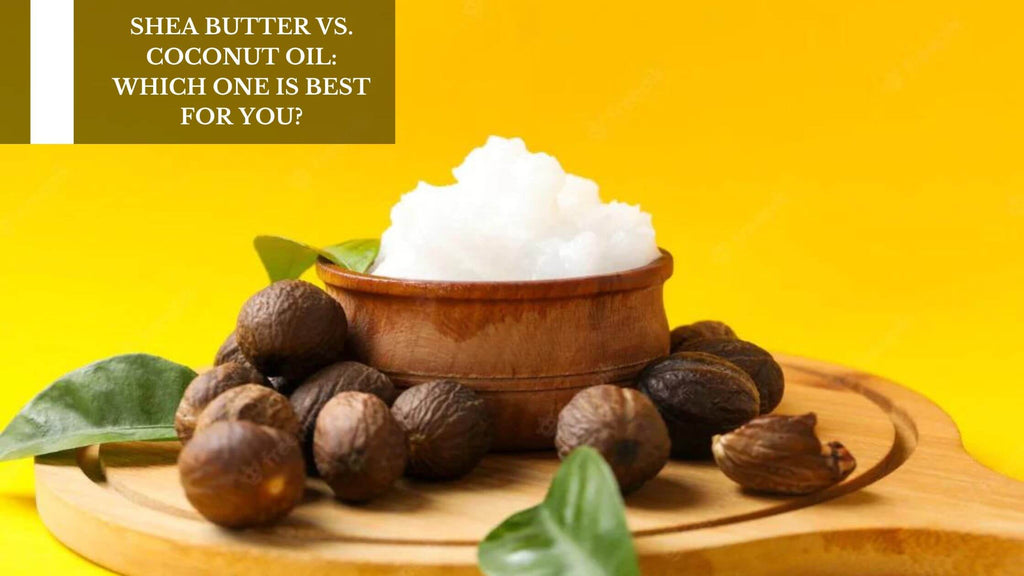
Coconut oil
Coconut oil’s health benefits are largely attributed to its rich MCT content, which not only aids in metabolism but also supports cardiovascular health.
Studies have shown that regular consumption of coconut oil can lower harmful LDL cholesterol while simultaneously raising beneficial HDL cholesterol, contributing to a healthier heart (source).
Additionally, the MCTs in coconut oil are known to promote weight loss and reduce abdominal fat, thereby mitigating risk factors associated with heart disease and high blood pressure.
Aside from its cardiovascular advantages, coconut oil is also celebrated for its potential to enhance brain function. The ketones produced from MCTs serve as an alternative energy source for the brain, which may have positive implications for cognitive health.
This aspect of coconut oil, combined with its metabolic benefits, positions it as a valuable addition to a health-conscious diet, despite the ongoing debates surrounding its high saturated fat content (source).
Butter
While it is important to consume butter in moderation due to its high saturated fat content, it does offer some health benefits:
- Rich in Fat-Soluble Vitamins: Butter is a good source of fat-soluble vitamins like vitamin A, E, and K2. These vitamins play crucial roles in various bodily functions, including vision, immune function, and blood clotting.
- Conjugated Linoleic Acid (CLA): Butter contains small amounts of CLA, a type of fatty acid that has been associated with potential health benefits, such as anti-cancer properties and improved body composition.
- Source of Healthy Fats: Butter contains a mix of saturated, monounsaturated, and polyunsaturated fats. While it’s high in saturated fat, which should be consumed in moderation, it also contains beneficial fatty acids.
- Supports Nutrient Absorption: The fat in butter aids in the absorption of fat-soluble vitamins (A, D, E, K) and other nutrients from the foods with which it is consumed.
- Contains Butyrate: Butter contains butyrate, a short-chain fatty acid that is believed to have anti-inflammatory and gut health benefits. It serves as a source of energy for the cells lining the colon.
- Rich Flavor and Texture: While not a direct health benefit, the rich flavor and creamy texture of butter can enhance the taste and palatability of foods, encouraging people to enjoy nutrient-rich meals.
Potential risks
:max_bytes(150000):strip_icc()/coconut-oil-gettyimages-601949920-960_1-05f6d97a6b664242bd19fb5dccc3d95a.jpg)
Coconut oil
Despite the touted health benefits of coconut oil, it’s important to approach its consumption with caution due to potential risks. Coconut oil is high in saturated fat, approximately 90%, which can influence blood lipid profiles by raising LDL cholesterol levels, a known risk factor for heart disease (source).
While it may not raise LDL cholesterol as significantly as butter, the impact on cardiovascular health is still a subject of ongoing research, and the long-term effects remain uncertain. Therefore, moderation is key when incorporating coconut oil into your diet.
Furthermore, the quality of evidence linking coconut oil to cardiovascular risk factors has been questioned, with some studies suggesting that the data is of poor quality (source).
This underscores the need for more rigorous research to fully understand the implications of coconut oil on heart health. Until more conclusive evidence is available, health experts recommend using coconut oil sparingly, especially for individuals with existing heart conditions or high cholesterol levels.
Butter
While butter is celebrated for its rich flavor and nutritional benefits, it is not without its potential risks. The high saturated fat content in butter has been associated with increased levels of LDL cholesterol, which is often referred to as “bad” cholesterol due to its link to heart disease.
Studies have shown that, compared to polyunsaturated oils, butter consumption can lead to higher LDL cholesterol levels, though not as dramatically as coconut oil (source).
This is a significant consideration for individuals with concerns about cardiovascular health, as managing cholesterol is crucial for preventing heart-related issues.
Moreover, despite the presence of beneficial nutrients like vitamin K2, which supports bone health, and CLA, which may aid in weight management, the balance of one’s diet is essential. Excessive intake of butter, particularly non-grass-fed varieties, could contribute to negative health outcomes over time.
Therefore, it’s advisable to consume butter in moderation, especially for those at risk of or currently managing heart disease, to mitigate the potential elevation in cholesterol levels and maintain a healthy balance of dietary fats (source).
Cooking and baking
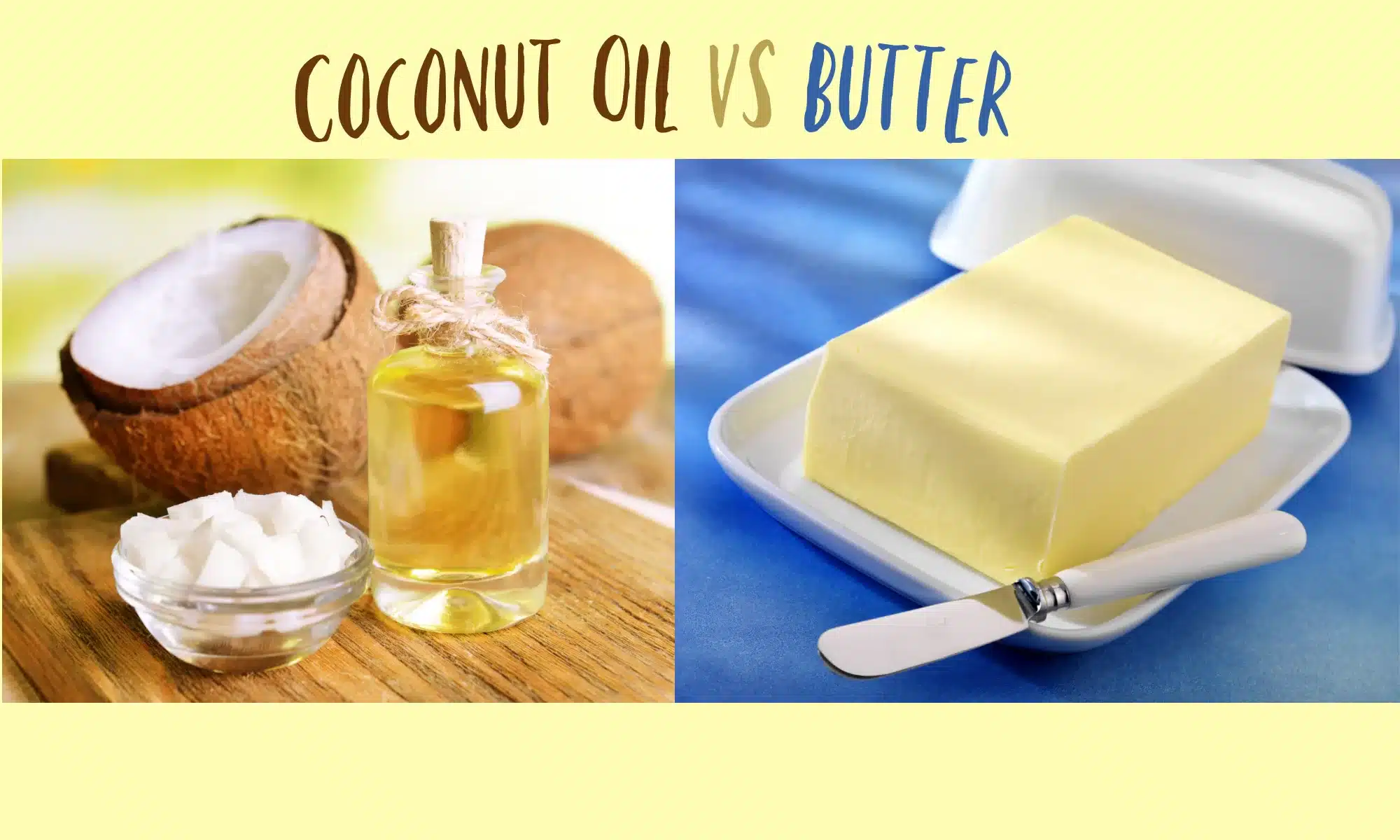
Coconut oil
When it comes to cooking and baking, coconut oil presents itself as a versatile and flavorful option. With a higher smoke point ranging from 350°F for unrefined to 400-450°F for refined varieties, it is well-suited for a variety of cooking methods, including sautéing, frying, and baking (source).
Its ability to remain solid at room temperature also makes it a viable substitute for butter or vegetable shortening in recipes that require a solid fat, such as pie crusts or pastries. The tropical essence of coconut oil can enhance the flavor profile of dishes, particularly in vegan and dairy-free cuisine.
However, while coconut oil can be a suitable alternative to butter in many recipes, it’s important to consider the final flavor and texture of the dish. The distinct taste of coconut oil may not always align with the desired outcome, especially in recipes where butter’s unique richness is paramount.
For those looking to experiment with coconut oil in their culinary creations, it’s recommended to start with small substitutions to gauge the impact on both taste and consistency (source).
Butter
Transitioning to butter in cooking and baking, this traditional fat is cherished for imparting a creamy, indulgent flavor to dishes.
With a lower smoke point of about 300-350°F, butter is ideal for gentle cooking techniques like sautéing and pan-frying, as well as for creating rich sauces and finishing touches that elevate the taste of a meal (source).
In the realm of baking, butter’s unique properties contribute to the tender, flaky textures of pastries and the soft, chewy consistency of cookies, making it a staple ingredient in many classic recipes.
While butter can be substituted with coconut oil in some cases, the substitution may not always yield the same sensory qualities expected from butter-based recipes.
The distinct buttery flavor is particularly crucial in certain baked goods and dishes, where it is not just an ingredient but a feature flavor. For those who prioritize taste and texture, understanding the role of butter in their favorite recipes is key to achieving the desired results.
When substituting fats, it’s essential to consider the characteristics of each and how they will interact with other ingredients to maintain the integrity of the dish (source).
Conclusion
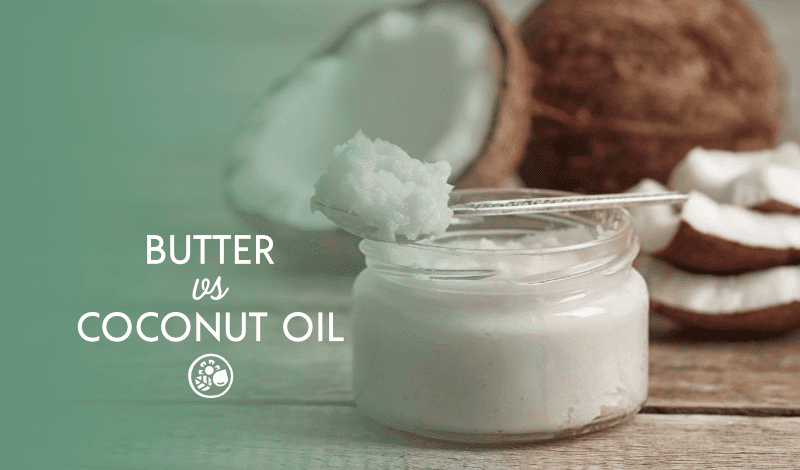
In the debate of coconut oil vs butter, both have their unique places in the kitchen, each bringing distinct flavors and benefits to the table. The choice between coconut oil and butter ultimately depends on personal dietary preferences, health considerations, and the specific culinary application.
While coconut oil offers a dairy-free alternative with a higher smoke point, making it suitable for various cooking methods, butter provides a classic taste that is difficult to replicate, especially in baking where it contributes to texture and flavor.
It’s important for home cooks and professional chefs alike to understand the properties of these fats to make informed decisions that align with their nutritional goals and flavor expectations.
As we consider the nutritional content, health benefits, and potential risks associated with coconut oil and butter, it’s clear that moderation and balance are key.
Whether you’re experimenting with coconut oil in your vegan desserts or savoring the rich taste of butter in your favorite pastry, being mindful of portion sizes and the overall context of your diet is essential. By appreciating the roles of both coconut oil and butter, we can enjoy a diverse
Sources:
- https://www.eatingwell.com/article/283864/this-or-that-butter-vs-coconut-oil/
- https://bmjopen.bmj.com/content/8/3/e020167
- https://www.health.harvard.edu/staying-healthy/coconut-oil
- https://www.drberg.com/blog/butter-vs-coconut-oil-which-one-is-healthier
- https://thecoconutmama.com/coconut-oil-vs-butter/
FAQ
Is coconut oil really better than butter?
Coconut oil significantly increased HDL cholesterol (‘good’ cholesterol) compared to butter or olive oil. Interestingly, C-reactive protein (a general marker of inflammation) was significantly lower in the coconut oil group compared to both the olive oil and butter groups. Apr 19, 2019
Is coconut oil better than butter for popcorn?
Coconut oil is an excellent healthy alternative to butter because it contains lauric acid. This type of medium-chain fatty acid has cardio-protective qualities. Pour coconut oil over your popcorn as a topping substitute for butter.
What oil is better for you than butter?
For one thing, butter is made up of 63% saturated fat, whereas olive oil only has 14%. Olive oil also contains heart-healthy monounsaturated good fats and antioxidants. Butter’s high saturated fat content, on the other hand, is shown in studies to lead to heart disease and other health issues.
Is coconut butter healthier than olive oil?
Olive Oil Is Healthier and More Nutritious That is because it is rich in good fat (polyunsaturated fat) and low in bad fat (saturated fat). Coconut oil contains 80 to 90 percent saturated fat. According to the experts, a tablespoon of coconut oil contains about six times as much saturated fat as olive oil.
Originally posted 2023-12-11 09:41:57.

